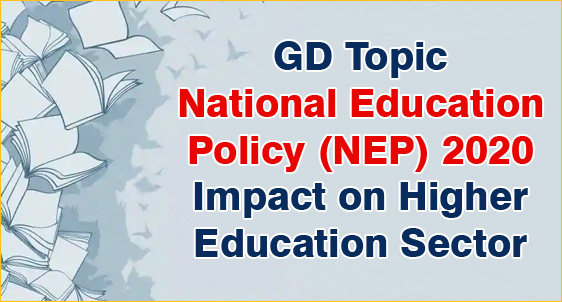
The Union Cabinet, chaired by the Prime Minister Shri Narendra Modi, approved the National Education Policy (NEP) 2020 on July 29. The new policy, which replaces the 34 year old policy of 1986, aims to pave way for transformational reforms in school and higher education systems in the country. The Prime Minister while delivering inaugural address at the University Grants Commission Higher Education Conclave on August 7, 2020 emphasised that the National Education Policy aims to keep the current and future generations ‘Future Ready’ while focussing on the National Values and National Goals. NEP lays the foundation of New India as it is based on a Holistic approach.
Also Read
With the launch of NEP new paradigms in higher education have now emerged and with effective implementation of the NEP-2020, India aims to become a global study destination providing premium education at affordable costs. NEP covers significant aspects like Holistic, Multidisciplinary and futuristic education, Quality Research, and Equitable use of technology for better reach in Education. Given the importance, ‘Impact of NEP 2020’is expected to be a hot GD Topic and Interview question for MBA and other entrance exams. MBAUniverse.com presents key facts, and likely impact of this far reaching policy. Read this report till the end for complete understanding.
In June 2017 a ‘Committee for the Draft National Education Policy’ was constituted under the Chairmanship of eminent scientist Dr. K. Kasturirangan, which submitted the Draft National Education Policy (NEP), 2019 to the Hon’ble Human Resource Development Minister on 31st May, 2019. After an elaborate consultation process lasting more than 1 year this document was accepted and approved by Union Cabinet on July 29.
NEP 2020 is a progress document and formulated keeping in mind the current national, social, and technological context. Noting the rise of Big Data, ML and AI, and changing Education Landscape, NEP document says, “The world is undergoing rapid changes in the knowledge landscape. With various dramatic scientific and technological advances, such as the rise of big data, machine learning, and artificial intelligence, many unskilled jobs worldwide may be taken over by machines, while the need for a skilled workforce, particularly involving mathematics, computer science, and data science, in conjunction with multidisciplinary abilities across the sciences, social sciences, and humanities, will be increasingly in greater demand.”
Putting emphasis on multidisciplinary education and learning, NEP 2020 says, “There will be a growing demand for humanities and art, as India moves towards becoming a developed country as well as among the three largest economies in the world.”
Setting ambitious goal, NEP 2020 says, “The aim must be for India to have an education system by 2040 that is second to none, with equitable access to the highest-quality education for all learners regardless of social or economic background.”
Key Goals of National Higher Education Policy
Some of the biggest highlights of the NEP 2020 are, 1) a single regulator for higher education institutions, 2) multiple entry and exit options in degree courses, 3) discontinuation of MPhil programmes, 4) low stakes board exams, 5) common entrance exams for universities. NEP 2020 also opens doors to Top 100 Global Universities of the World to set up campuses in India.
Let us review these highlights of NEP in three parts – School Education, High Education and Other important sectors.
NEP 2020 Highlights for School Education
NEP 2020 Highlights for Higher Education
NEP 2020 Highlights for other Sectors
Calling for reforms in education content and pedagogy, NEP 2020 notes, “Education thus, must move towards less content, and more towards learning about how to think critically and solve problems, how to be creative and multidisciplinary, and how to innovate, adapt, and absorb new material in novel and changing fields. Pedagogy must evolve to make education more experiential, holistic, integrated, inquiry-driven, discovery-oriented, learner-centred, discussion-based, flexible, and, of course, enjoyable.”
There are many other provisions in NEP aimed at promoting holistic and relevant education. We hope you found this review on NEP 2020 useful.
Also Check Latest Group Discussion GD Topics
Exam 2024 Notification